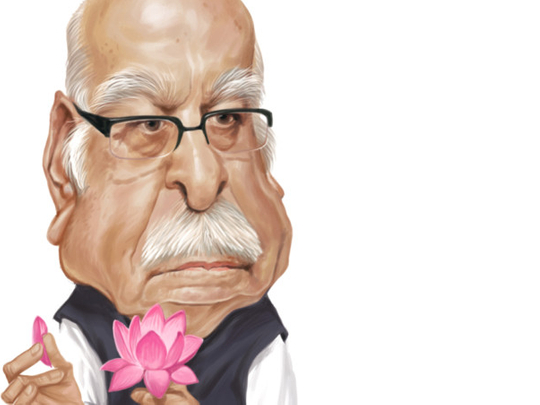
On a flight 11 years ago, a tense prime minister Atal Bihari Vajpayee and his deputy Lal Krishna Advani sat facing each other, reading newspapers. They were heading to Goa for their party meeting at the Marriott Hotel, held in the backdrop of the 2002 Gujarat communal violence. The discomforting silence between the two Bharatiya Janata Party leaders was broken by journalist-turned politician and cabinet colleague Arun Shourie. He gently pulled the newspaper from Vajpayee’s hands and told him to discuss Gujarat chief minister Narendra Modi’s fate. Vajpayee’s National Democratic Alliance government was under pressure to sack Modi for his inability to stop the riots in which around 2,000 were killed. Vajpayee made it clear he wanted Modi to go, but Advani countered him, saying the chief minister’s dismissal would lead to an uproar in the party.
This was the second time that Advani had stopped Vajpayee from dismissing Modi. A dejected Vajpayee had then decided to resign from the prime minister’s post. “He pulled a piece of paper and he started writing his resignation by hand. I held his hand and he looked at me severely and I said what are you doing… I somehow persuaded him. We went to his house. We were able to defuse the situation,” BJP leader Jaswant Singh recalled in a televised interview in 2009.
Advani was determined to protect Modi, who after all was his arch protégé, someone he hand-picked and para-dropped in Gujarat where BJP was heading for an electoral defeat. The brief conversation in 2002 between the top two leaders changed India’s political discourse in the subsequent years. But Advani would not have imagined that his protege Modi would one day challenge his own status of BJP’s patriach.
Poster boy
Last Sunday, when the BJP rank and file was rallying behind a buoyant Modi in Goa, anointing him the party’s poster boy for the 2014 elections, Advani was sulking at his Prithviraj Road bungalow in New Delhi. For the first time since the BJP’s inception in 1980, Advani skipped the national executive meeting in an apparent attempt to stonewall Modi’s rapid rise. While the 85-year-old cited tummy infection as the reason for his absence, it is an open secret that he was hoping his party would not announce Modi’s name in his absence.
By the afternoon on Sunday, the BJP made Modi the head of a powerful election panel, dealing a blow to Advani’s ambitions and image and swiftly changed equations in a party he had single-handedly built.
From just two elected members in parliament in 1984 to the ruling party in 1996, Advani made BJP a dominant force in India where the Congress had a free run till the 1980s. His nation-wide campaign to build a Ram temple made him a Hindutva mascot, an image he tried to change later.
A master strategist and a clever politician, Advani knew very well he was denied the prime minister’s post because his hawkish image was not acceptable to BJP’s allies and a moderate, inclusive Vajpayee was found more suitable to rule India. In the last ten years, he made several attempts to shed this tag of Hindutva mascot, only to anger his party colleagues. In 2005, the Karachi-born Advani travelled to Pakistan and visited the tomb of the Islamic nation’s founder Mohammad Ali Jinnah. He described Jinnah as a secular leader, inviting a sharp rebuke from BJP’s parent organisation RSS and ridicule from his party colleagues.
Since an ailing Vajpayee faded away into oblivion, Advani projected himself as a moderate capable of reaching out to allies who don’t subscribe to the BJP ideology. At 85 today, he still harbours the ambition of becoming prime minister. But his flight of fantasy abruptly came to a halt on Sunday when his party rallied around a younger and charismatic Modi in Goa.
Personal agenda
Next day, Advani stunned his party by resigning from all party posts. Knowing that public embarrassment is a potent weapon, he accused BJP leaders of pursuing personal agenda and sent his resignation letter to the media. By doing so, he sought to slow down the momentum of Modi’s rapid rise. The BJP leaders ruled out a compromise on the Modi issue but reached out to Advani in an attempt to persuade the patriarch.
On Tuesday, Advani agreed to take back his resignation only after a phone call from RSS chief and an assurance from the BJP that he would be consulted on future party decisions, including on the prime ministerial candidate of the party in 2014 elections.
It is dangerous to make predictions in politics and only time can tell how long the old fox of the BJP will lie low.
While this week’s crisis triggered by his resignation seems to have blown over for now, a tussle for the prime minister’s post between Modi and Advani is not ruled out in the run-up to elections next year.










